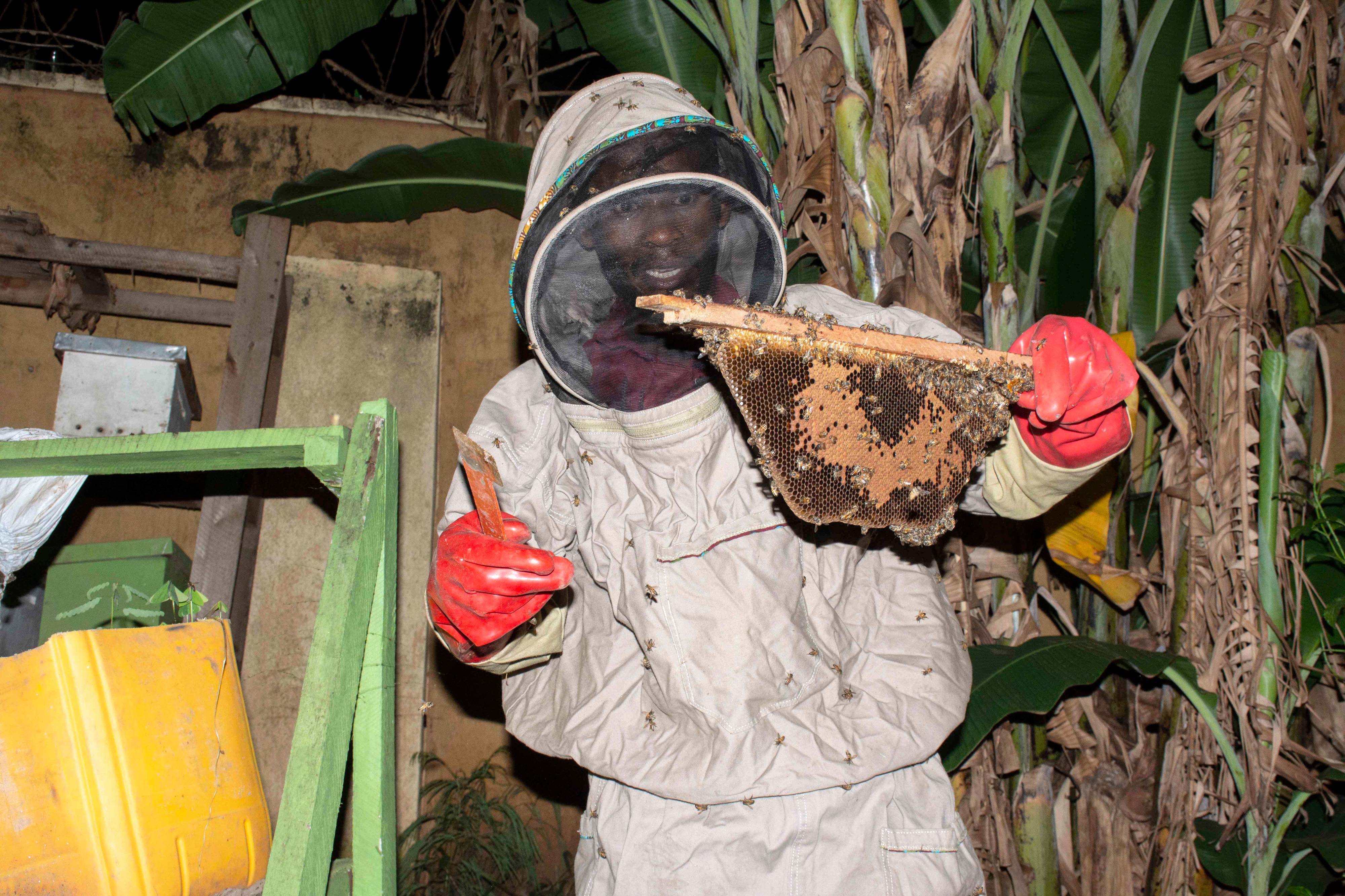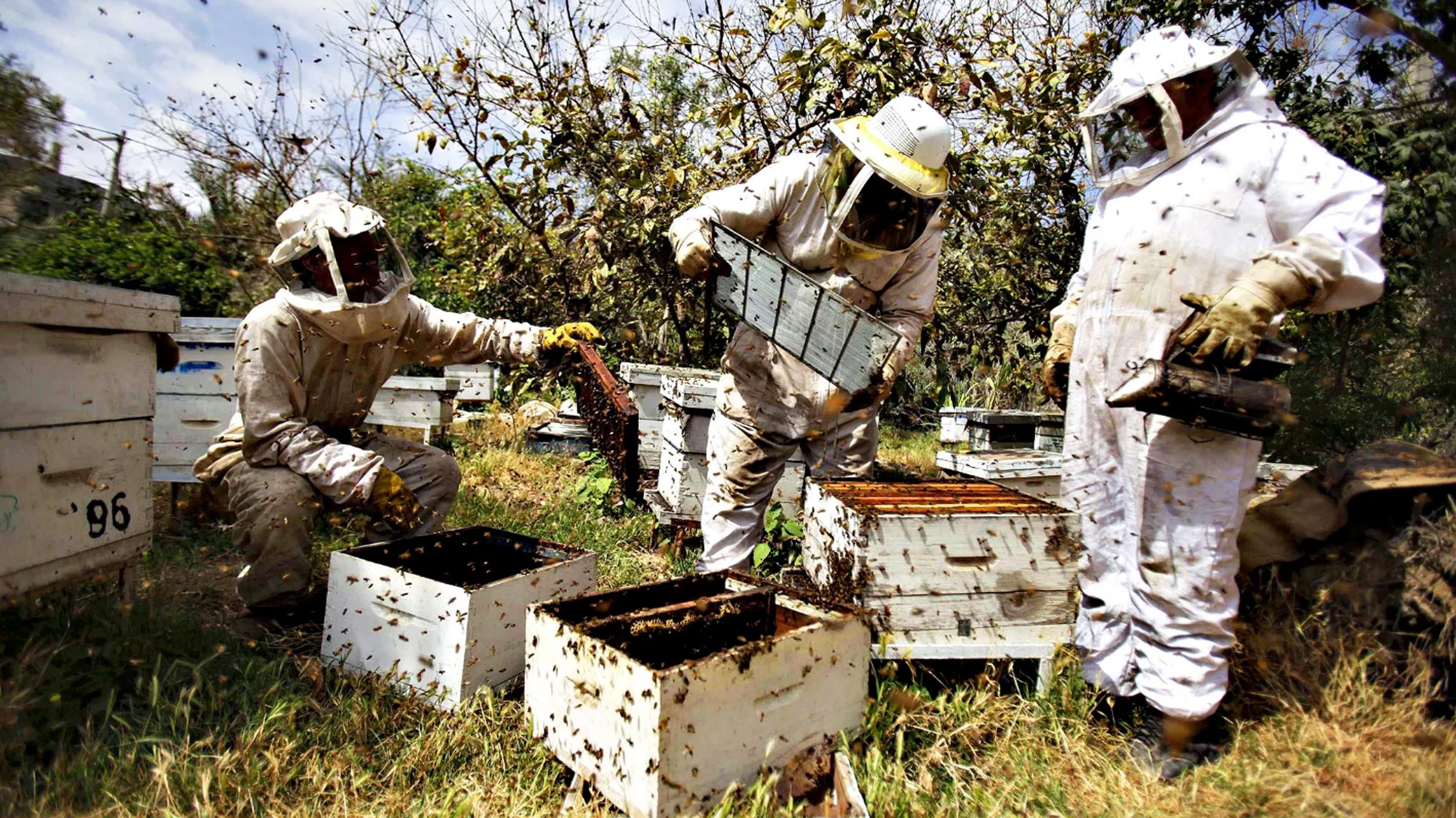Prime
Kuteesa has built family business through peri-urban beekeeping

Moses Kuteesa explains how he keeps bees in an urban area. Photo/Esther Bridget Nakalya
What you need to know:
- According to Moses Kuteesa, bee farming has a lot more to offer than just honey. He says these products are not only medicinal but also offer a great range of usage in home management.
A bee farmer in Ntinda, Kigoowa road, a Kampala suburb has changed the face of beekeeping. Moses Kuteesa, the proprietor at Bee farmers crib has built chests of bees in his rental compound.
How he does it
“I want to change the mind-set of how people think bees are only kept in the wild or only require big chunks of land to rear them,” he says.
According to the bee farmer, the colonies have supportive feeding structures for the urban setting as opposed to the rich vegetation upcountry.
“The bees in Kampala have nectar sources from markets, they pick flour and sugar from shops and flowers in people’s compounds,” says Kuteesa.
With about 200 clients and four branches in Kampala, Bee farmer’s crib has grown into a research centre especially in queen rearing, and colony multiplication within the outskirts of Kampala.
Here he shares his opportunity in search of self-employment through a venture that has benefited his family.
Starting out
Thirteen years ago, Kuteesa handled monitoring and evaluation at a project that exposed him to the visible impact that beekeeping had on livelihoods.
“As a records manager, I was working for an NGO firm, where I monitored development projects in West Nile, Western Uganda and Central,” he confirms.
His interest he shares greatly laid on beekeeping which the locals effortlessly participated in to change their lives and increase their incomes.
On the job, he would focus on evaluating and solving challenges that bee farming families faced to make bee farming a more profitable venture.
In 2019, Kuteesa was laid off his job but not his knowledge in bee management. He then decided to set up a small apiary in his compound.
“I would pick bees from the roof and store it away, a practice which my immediate neighbours adapted in supporting me,” he says.
The expert adds that he would release the bees during the late night hours while the neighbourhood was sound asleep to hunt for nectar in order to build strong colonies.
Family business
His family also grew a keen interest in his initiative, especially his wife. “My wife was a seamstress and she offered to make bee suits to protect us during hive visits,” says Kuteesa.
She also involved their children in packaging, labelling and filtering the honey and sometimes even physically participated in bee removal and inspections.
With a great support system, the bee farmer opened up his first honey shop with only four jerricans of honey and two bee hives.
“It was during the Covid-19 lockdown and honey products were on high demand which gave me ground to make more profits which I invested into my business,” he recalls.
Two years later, the bee farmer expanded his business into a registered entity and supplier of honey products as well as offer training across the country in value addition and the making of bee farming equipment.
Value addition
According to Kuteesa, bee farming has a lot more to offer than just honey.
He says these products are not only medicinal but also offer a great range of usage in home management.
He tips, “Jelly from bee wax, candle wax and soaps are of great addition in home consumption among users.”
These essentials are valuable and are collectively manufactured off bee wax also adding that the soaps are good for skin care treatment.
He adds, “Other products such as pollen, propolis, bee venom act as treatment options for fungal infections, and also cough remedies.”
The expert also hints on the value attached in training knowledgeable practitioners through workshops that also offer advisory services and apiary setups and management to bee farmers hence promoting best practices and skilfulness.
This he says has also enhanced a wide clientele for his bee products as value addition is made worthwhile with a marketing push.
He explains, “I used social media in networking with people who would give us referrals which added greatly onto the purchasing levels and also road side stalls where we teach people about bee farming.”
Challenges
Kuteesa cites the intensive use of pesticides and fungicides by farmers as a threat to bee keeping in Uganda among others.
Deforestation she adds has greatly affected production in a bid to cut down acacia trees for charcoal, which keep colonies active in search for nectar from the pollen and rich vegetation.
He explains, “The average production of a KTB hive was initially 25kgs and has now dropped to 10kgs per harvest.”
He also shares that he is confronted with the challenge of inbreeding of species which causes unproductive hives and encourages a government initiative in streamlining breeding centres.

Kuteesa tends to his bee-hives. Photo/Esther Bridget Nakalya
Future plans
From owning one research apiculture centre, the bee farmer envisions setting up the biggest centre for apiculturists in Africa.
“We look forward to partnerships in securing at least two to five miles and participate in tree planting and crop growing to enhance bee activity,” he notes.
The beehive owner plans to advance from four to multiple apiaries within the country in the urge of promoting eco-tourism.
Kuteesa advices bee farmers to ensure good feeding practices, regular checks on colony productivity, record keeping to monitor hives and growing of crops such as banana plantations, coffee and fruits to enable pollination among bees hence strengthening colonies.
Profit
From owning one research apiculture centre, the bee farmer envisions setting up the biggest centre for apiculturists in Africa.





